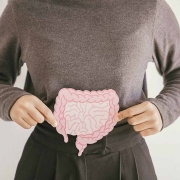Identifying the Root Cause of Digestive Symptoms
Food is at the very center of everything that we do. The nourishment obtained from food is what keeps our body strong, fit, and healthy.
Digestion is an important part of our overall well-being. It’s intricately tied to a healthy immune system and the ability to fight disease. The gut microbiome, which is composed of hundreds of billions of bacteria and viruses residing in our intestines, is often referred to as our “second brain” because these friendly bugs produce and release brain chemicals such as serotonin that is directly linked to our mental health and improvement of depression and anxiety. That’s why unhealthy diets may worsen those symptoms.
At The Kaplan Center we don’t think of digestion as just the mechanics of eating. Digestion is a whole-body process. When looking for solutions to treat digestive problems, that’s exactly how we view it.
Imbalances in the digestive system
Digestive disorders in the United States are on the rise, and along with it the sales of over-the-counter (OTC) drugs and supplements. Self-medication and self-supplementation may also be a contributing factor to the exacerbation of certain conditions and can sometimes cause more harm than good. It is always encouraged to check with your healthcare provider prior to taking OTC drugs and supplements.
Symptoms related to the Gastrointestinal System (GI) issues can vary widely, sometimes unrelated to digestive discomfort.
Common signs and symptoms of digestive disturbances:
- Gas
- Bloating
- Abdominal discomfort or pain
- Constipation/Diarrhea
- Skin conditions such as acne
- Vitamin deficiencies that may be the result of improper nutrient absorption, leading to fatigue, sluggishness, or low energy
In some cases, these symptoms can be traced back to specific digestive disorders such as Inflammatory Bowel Disease (IBD), Irritable Bowel Syndrome (IBS), Small Intestine Bacterial Overgrowth (SIBO) or Gastro-esophageal reflux syndrome (GERD). At other times, these symptoms appear as a secondary manifestation of an autoimmune or infectious disease.
Investigations
Issues with the digestive system can stem from a wide range of sources. Doctors will start by taking a full medical history to find out about your specific concerns. If needed, they may recommend routine lab work to rule out any autoimmune disease such as Celiac or Crohn’s Disease. They may also order functional testing of your gut bacteria (to check if you have any harmful bugs) and look for any inflammatory markers that may be contributing to your symptoms.
Treatment options
Treatment options for digestive disorders will vary and are patient-specific. Depending upon your symptoms, medical history, and lifestyle, our doctors will use that information alongside the results of any relevant tests. Our goal is to figure out the root cause(s) of your symptoms and how best to address them.
Treatment may include a combination of:
- Nutritional counseling
- Stress management
- Supplemental Support
- Acupuncture
Good food and good digestion are essential for good health. Using an integrative approach, our goal is to take an in-depth look at the issues and use a variety of proven treatments to improve your digestive health.











Leave a Reply
Want to join the discussion?Feel free to contribute!